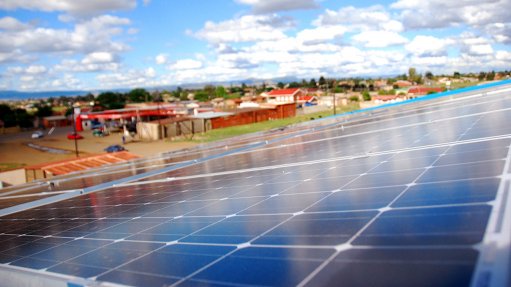
Connecting rooftop solar photovoltaic (PV) systems to the national grid and incentivising contributors could ease municipalities’ fears of a loss in revenue and challenges around unregulated connections of the carbon-friendly technology.
The take-up of net metering, where rooftop output is connected to the grid and suppliers receive credit for contributions made, would enable local municipalities to control connections and limit revenue loss as residential, commercial and industrial users shifted from carbon-intensive power generators to more environment-friendly options such as solar.
Municipalities derived up to 70% of their income from electricity sales and concerns had emerged that solar PV installations could both reduce demand and provide cheaper output in ways which would jeopardise their finances, a report by independent consultants Frost & Sullivan revealed.
South African Photovoltaic Industry Association chairperson Davin Chown explained: “Municipalities can protect the financial viability of their electricity supply operations by ensuring that the cost of network connectivity of each customer is recovered, even when PV zeroes the net energy consumption, and that the cost at which energy is bought from a PV exporter is no more than the equivalent cost paid by the municipality to Eskom.”
This emerged after the conclusion of an analysis of Riversdale municipality, in the Western Cape, by the Centre for Renewable and Sustainable Energy Studies, in conjunction with Stellenbosch University, to determine the financial viability of solar PV for municpalities.
The study found that the risk to revenue of unregulated rooftop PV connections for mid-size municipalities like Riversdale was likely to be negligible in the short term.
Frost & Sullivan’s ‘Solar PV Market Assessment’ report pointed out that net metering regulations, such as those intitiated in Brazil and Germany, could be applied locally, potentially “unlocking huge market potential for residential, commercial and industrial applications for solar PV”.
With the implementation of State incentives, returns would be comparable to the historic performance of property investments, added Stellenbosch University researcher Karin Kritzinger.
She noted that “even without additional incentives, the modelling established that an investment in rooftop PV would provide home owners with similar financial returns to investing in a money-market account.”
But authorities would need to fast-track incentive schemes and guidelines “if they want to have any form of control” over the impact of such technology embedded into the distribution systems, Chown warned.
Technical standards for the supply and metering of solar PV power should be finalised nationally, with municipalities establishing tariffs in line with the National Energy Regulator of South Africa and installing systems to encourage legal uptake of the technology.